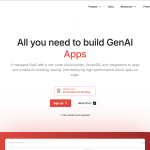Editor’s Note: Dify.ai is an open-source GenAI development platform that helps teams quickly build, test, and launch production-grade AI agents and workflows—no heavy infrastructure required.
- ✅ Drag-and-drop workflow builder for AI pipelines
- ✅ Real-time prompt IDE for fast iteration
- ✅ Plugin marketplace with RAG, tools, and API integrations
- ✅ Supports OpenAI, Claude, Llama2, ChatGLM, and more
Verdict: Dify.ai combines developer speed with enterprise-grade stability, making it a strong choice for building scalable GenAI tools.
What is Dify.ai?
Dify.ai lets developers and product teams build AI-powered applications with minimal setup. It includes tools for workflow orchestration, prompt testing, model integration, and observability—all in a single open-source stack. It’s suitable for startups validating MVPs as well as enterprises deploying internal agents.
Core Features
- Workflow Studio: Visual builder for chaining prompts, models, and external APIs
- Prompt IDE: Live testing and debugging of prompt outputs
- Plugin Marketplace: Prebuilt integrations like Google Search, Notion, and Azure OpenAI
- Observability: Monitor performance, latency, and errors in production
How It Compares
Dify balances visual design and developer control better than LangChain (dev-heavy) and Flowise (UI-limited). Its Domain-Specific Language (DSL) enables advanced customization, while its low-code interface makes it accessible to cross-functional teams. Unlike other tools, it’s built for production from day one.
Use Cases
- Build AI assistants for operations, sales, or support teams
- Automate document summarization or search with RAG pipelines
- Run multi-step prompt workflows for marketing content or data tasks
Performance & Scalability
Dify supports real-world deployment at scale. With over 1M applications built across 150+ countries, it delivers enterprise-grade stability, security, and flexibility. Teams can self-host or extend functionality via plugins—without deep ML ops.
Pros and Cons
| Pros | Cons |
|---|---|
| Low-code workflow builder with DSL for power users | Advanced agent logic may need onboarding |
| Supports all major LLMs and third-party tools | Plugin ecosystem is still growing |
| Open-source with active community and roadmap | No official paid support tier yet |
Final Verdict
Dify.ai is one of the most complete open-source GenAI platforms available. It removes friction for teams building real AI workflows while remaining flexible and scalable. For builders aiming to ship fast without cutting corners, Dify is a top-tier choice.
Rating: ★★★★☆ (4.6/5)
Explore More: Visit Dify.ai Official Site
Explore more open-source GenAI tools and AI development platforms:
Explore More AI Founder Interviews
Alexander Alten on Self-Hosted Data Intelligence with Scalytics
AudioSep Review: Separate Anything You Describe with AI Audio Tools


